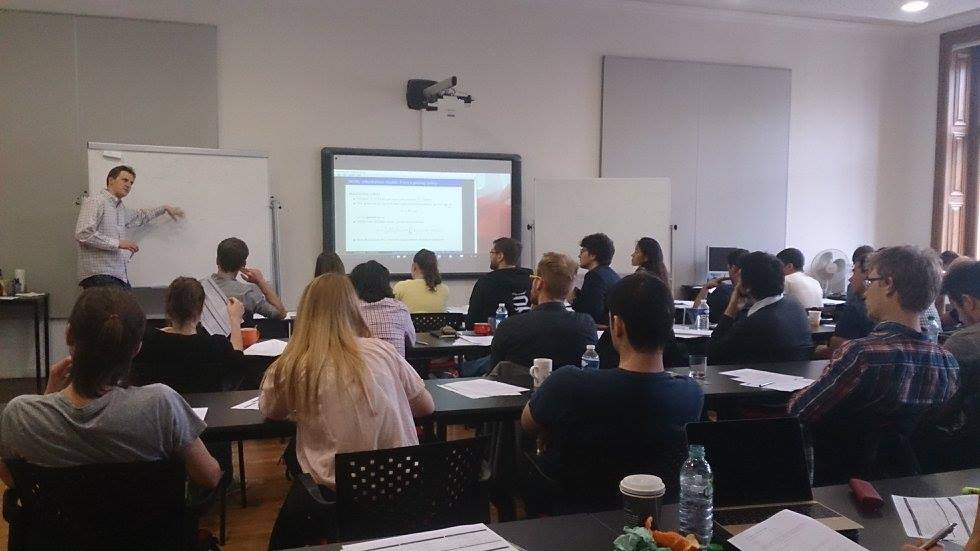Inattention, why we’re all doing it, and why that’s rational – according to economics.
In the lead up to CERGE-EI’s unique conference on Rational Inattention, Associate Professor with Tenure and Researcher, Filip Matejka, provided a free crash course for students to get a rundown on the subject.
Fairly new to the scene and quickly evolving, the field of Rational Inattention in economics is, quite ironically, gaining attention. On Wednesday 24th of May, graduate students from around the globe, including Stanford, NYU, Columbia, UCLA and more, gathered in Prague to learn and discuss the core issues of the subject.
So what’s all the fuss?
For a long time, even before the onset of the financial crisis in early 2008, many have questioned and criticized the knowledge and computational capabilities of economists and their ‘rational agents’. It’s not fresh news that people are not omniscient automatons reacting instantaneously to any and all new information updates. People and firms need to select and structure information that is relevant to them in order to make decisions. This reality of human capacity and firm behavior, also known as market frictions, is something economists have long sought solutions to understand and incorporate into economic models.
About 30 years ago the idea of rational inattention appeared in the form of ‘information friction’ and ‘stickiness’ in relation to prices. Nobel laureate Prof. Christopher Sims (Princeton University) introduced this idea of allocating attention to particular information, meaning that markets will not correspond to all news as appropriately as we might hope, if at all.
Living in the ‘age of information’ that is saturated with all sorts of data and knowledge, people are more than ever before selective of what information they will take in. Rational Inattention seeks to understand not only what information people and firms pay attention to, but also what information they’re likely to ignore, or as Prof. Henry Farber from Princeton University put it, “When it makes sense to zone out.”
“Will that be on the exam?”
One of the first and most repeated questions heard when the study semester draws to an end always seems to be, “what do I need to study?” or alternatively, “do you think I need to study that?” Students already know that they can’t memorize and apply every sentence of that 400-page textbook plus lectures and added materials. When time is scarce, the stakes are high, and the information seems endless, the priority is to know what you need to know, and forget about the rest. Theory of Rational Inattention looks to understand how many questions should be asked and how deep the search should go before the quest becomes a waste of time.
Jobless or Nameless: Employers Decide
The implications of understanding rational inattention are vast both in microeconomic interactions and macroeconomic dynamics. For example, the failure that one has in securing a job can be in many cases explained by rational inattention in the labor market. In a paper soon to be published by the American Economic Review, CERGE-EI researchers looked into how the surname of an applicant will impact the attention a CV application will receive from hirers.
With hundreds of applications, HR workers may often subconsciously ethnically profile candidates through names, paying less attention to those with expected lesser quality despite the content and qualifications being of exact same quality. This sort of passive discrimination leads economists and policy-makers to come up with possible interventions such as blind CVs.
Beyond job opportunities, understanding how people allocate their attention can have profound effects on everything from price volatility to escaping the poverty trap in developing nations. Researchers from University College London, who attended Matejka’s crash course ahead of the Rational Inattention conference later that week, came to discuss issues and ideas with students interested in the field. Professor Vasiliki Skreta, a Microeconomic Theorist at UCL, commented on the uniqueness and significance that the field has brought to microeconomics. According to Skreta, Rational Inattention can bring new insight into economic behavior and interactions between information and agents.
Generating controversy at the beginning, economists criticized rational inattention for its supposed trivial effect in economic interactions. Today, the idea is more widely accepted with many recognizing the importance of information frictions as a stepping-stone to better models and policy making. Over the past 3 decades, researchers across the globe have worked to build up theory, but as Matejka remarked, much more work is needed in elaborating empirical evidence in Rational Inattention.
